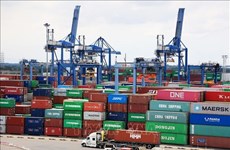Banks need to relax mortgage requirements
According
to latest figures, as of March 15, banks have lent nearly 1.322
trillion VND (62.1 million USD) to over 3,000 home-buyers and pledged to
provide nearly 2.9 trillion VND (136.3 million USD) for another 3,000
individual clients.
Not long ago the Ministry of Construction
(MOC) proposed that the Prime Minister should relax some regulations to
make the loans more accessible, thereby quickening the pace of
disbursement.
One of the barriers blocking home-buyers from
borrowing is collateral. Nguyen Ngoc Lan, a health worker in Hanoi’s
Dong Da district, said “We don’t have enough money to buy homes so we
have to think about borrowing from banks. But they want us to put up
something valuable as collateral for loans. How can we get valuable
properties to be used as collateral when we don’t have much money?”
Meanwhile, banks do not accept homes that will be bought in the future
with their loans as collateral, which is effectively preventing many
from enjoying the benefit of this programme.
Deputy Minister of
Construction Nguyen Tran Nam said the circular signed between the MOC,
the State Bank of Vietnam (SBV), the Ministry of Justice and the
Ministry of Natural Resources and Environment, effective from April 21,
will remove one of the biggest bottlenecks when permitting home buyers
to put up their future homes as collateral for bank loans. The circular
will be issued along with a number of other regulations to prevent the,
already high, ratio of bad debt from rising.
The new circular
lays the foundation for banks to speed up their lending as contracts to
buy social housing and commercial housing will have similar terms and
conditions with the only difference being that the interest rates are
lower for social housing. Both types of housing have to comply with
relevant procedures and regulations.
Luong Van Cuong, a resident
in Ho Chi Minh City’s District 9, said this move is worth celebrating
but was still in doubt, “Even when banks use future homes as collateral,
we can’t borrow. With an income of just 5 million VND (235 USD) each
month, how can we convince banks that we can pay back.”
Deputy
Minister Nguyen Tran Nam said that problems arising during the
disbursement of this loan package are being gradually removed. Although
the pace of disbursement is slow, the MOC still does not want to rush
because it wants the loans to be brought to those who really need.
Nevertheless, after discussions with the SBV, the MOC has proposed the
Prime Minister make amendments to some regulations, including extending
the payment term from 10 years to 15 years for home buyers, relaxing
restrictions on who can borrow and including more commercial banks in
the programme.
The limited supply of social housing is one of the
primary reasons behind slow disbursement. The solution, therefore, is
increasing the supply of affordable housing. In addition to social
housing projects under construction, Vietnam has about another 57
projects that are in the process of converting from commercial to social
housing with around 35,000 apartments. There are also another 62
projects which are being modified, with the number of apartment expected
to rise from 32,000 to 40,000. Most of these projects are located in
Hanoi and Ho Chi Minh City.
The Hanoi municipal People's
Committee has issued 13 decisions approving the conversion of three
commercial housing projects to social housing and ten others for
structural modification. Ho Chi Minh City authorities have also agreed
to convert five commercial housing projects into social housing, adjust
four projects, and turn one project into a hospital.
According to
the SBV, the Ministry of Transport has announced a list of 81 projects
eligible to access the 30 trillion VND credit package but many projects
have yet completed legal procedures, making it impossible for commercial
banks to give loans and make disbursement.
Chairman of the Ho
Chi Minh City Real Estate Association Le Hoang Chau said that the
stagnancy is due to the lack of drastic measures and close co-ordination
between ministries, sectors and localities. Many property enterprises
have submitted files for the conversion of their housing projects for
over a year but have not received reply. Chairman Chau suggested the Ho
Chi Minh City's People Committee define clearly the criteria necessary
to be met to allow the conversion of commercial projects into social
housing and for the restructure of apartments, so that property
enterprises could actively seek solutions to solve their hindrances.
Director
of Phuc Khang Construction and Investment Corporation, Luu Thi Thanh
Mau said that property companies need the elimination of bottlenecks in
administrative procedures. Intricate and prolonged administrative
procedures often push real estate prices up and put property enterprises
in difficult positions, thus causing financial difficulties for
home-buyers. In previous years, a housing project only took about seven
months to complete administrative procedures but now it takes three to
five years or even seven years to finish. Thus, if 50-70% of
administrative procedures are cut, each project will take one year to
complete procedures and housing prices will certainly be reduced
significantly.
Facing lots of obstacles, real estate enterprises
are waiting and hope for more preferential policies from the Government
but Deputy Minister Nguyen Tran Nam affirmed that the 30 trillion VND
credit package aims to assist low-income earners with housing
difficulties to have access to preferential loans to buy homes but it is
not a rescue package for the real estate market.
The conversion
of commercial housing projects into social housing, which are in high
demand, is too sluggish because of cautiousness from the banking sector,
the low disbursement of loans and the stagnancy of authorised agencies.
Currently,
the SBV and the MOC are asking localities to simplify administrative
formalities, shorten the approval time of housing projects and speed up
project progress to increase the supply of social housing and commercial
apartments below 70 sq.m and priced under 15 million VND per sq.m.
In
the coming time, the MOC will continue co-ordinating with the SBV,
ministries and sectors to accelerate the progress of lending to meet the
expectations of the public. At the same time, the MOC suggests the
Government do not grant investment licenses to new commercial housing
projects and new urban areas projects in 2014 to reduce the pressure on
the real estate market.
It is hoped that the implementation of
adopted policies as well as policies to be issued in the future will
create impetus to disburse the loan package and facilitate the access to
this package.-VNA













